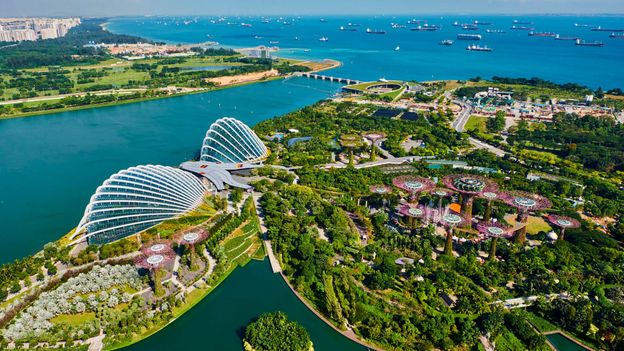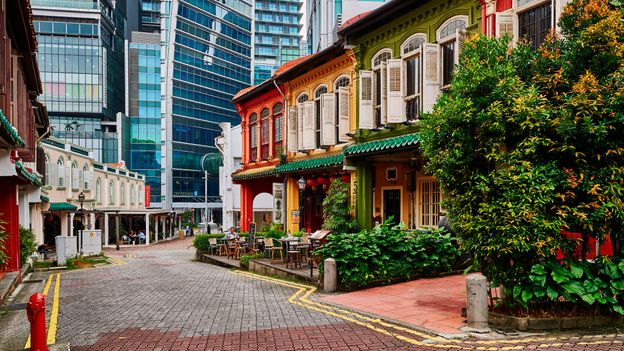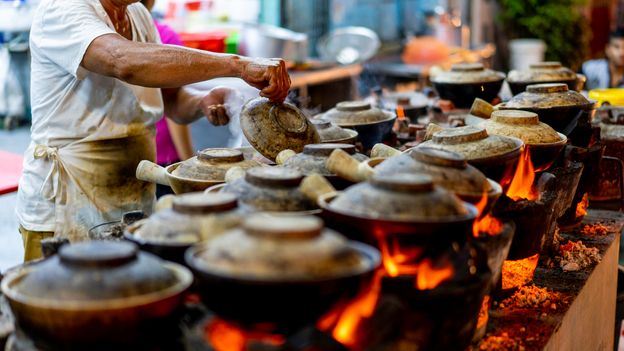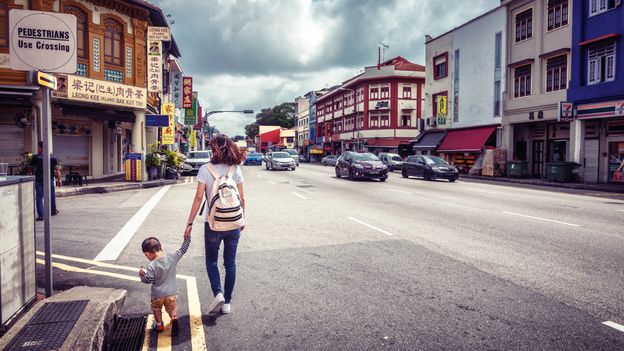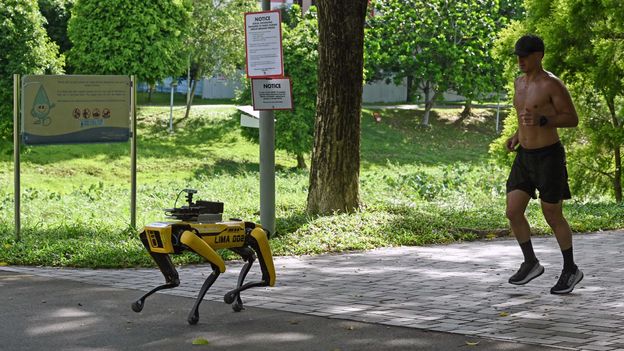It hits me every time I step off the plane: the sudden chill of full-blast air con and the distinct scent of orchid-tea fragrance diffuser. Airports can feel nondescript, but arriving at Changi – both today and long before the Covid-19 pandemic – is a uniquely Singaporean experience. On the way to passport control, walking through the perfumed air, you'll see immaculately kempt green walls and tidy water features, teams of janitorial staff (in both human and robot form) and high-tech washrooms with interactive feedback screens.
If you leave the airport expecting the rest of the city to be this orderly and clean, you won't be disappointed. Once described by the New York Times as a place "so clean that bubble gum is a controlled substance", Singapore is universally known for its perfectly paved roads, manicured public parks, and spotless, litter-free streets.
But cleanliness is more than a merely aesthetic ideal here. In this small city-state with just under 56 years of national independence under its belt, cleanliness has been synonymous with major social progress, unprecedented economic growth and, most recently, a coordinated containment of the coronavirus pandemic.
While Singaporeans themselves tend to humbly shrug off the suggestion their country is especially clean, its leaders have done everything they can to procure and maintain a pristine public image. "Singapore's clean reputation is something the government consciously sought to promote," explained Donald Low, a Singaporean academic and public policy scholar. "Originally, that cleanliness had at least two connotations: the first was physical, or environmental, cleanliness; the second was a clean government and society that didn't tolerate corruption.
You may also be interested in:
• Is this the safest city in the world?
• What Japan can teach us about cleanliness
• Is Singapore suffering from FOMO?
Having separated from Malaysia in 1965, Singapore, led by then-prime minister Lee Kuan Yew, had lofty ambitions of becoming a "first-world oasis in a third-world region", as he termed it. "As a newly independent city-state that was keen to attract foreign investments, Lee Kuan Yew believed, correctly, that these things would differentiate Singapore from the rest of South-East Asia," Low explained.
In practical terms, achieving cleanliness meant developing quality sewage systems, creating programmes to combat dengue and disease, a decade-long cleanup of the heavily polluted Singapore River, island-wide tree planting and the transition of once-ubiquitous street food vendors into covered hawker centres.
It also meant enacting a multitude of nationwide public hygiene campaigns appealing to Singapore's citizens to do their part. "Keeping the community clean requires a people conscious of their responsibilities," proclaimed Lee at the 1968 inauguration of Keep Singapore Clean, a now annual anti-littering initiative. Lee's speech sought to arouse a new sense of national pride among Singaporeans, appealing to a collectivist, communitarian spirit that he saw as vital to achieving the nation's goals.
As the city-state's environmental conditions improved, so did Singapore's appeal to foreign investors and tourists alike, ushering in an extended period of unprecedented economic growth. These days, Singapore regularly tops polls ranking social conditions, such as personal safety and quality of living, among global cities; while its highly developed free market economy ranks as one of the most competitive on the planet.
Nowhere feels more emblematic of the nation's modern-day vigour than its Central Business District, where shiny, sky-scraping office towers – home to thousands of international headquarters – sit beside world-class luxury hotels, including the iconic Moshe Safdie-designed Marina Bay Sands. It's the kind of futuristic utopia that its founding prime minister could have only dreamed of.
It irked Lee that, despite his country's achievements, he'd somehow always be asked about the notorious chewing gum ban during interviews with foreign media. It's unlikely that he foresaw the level of global attention it would elicit when enacting the law in 1992 to combat the expense of cleaning pre-chewed gum from public places, like the then-brand new MRT (public transport) system. These days, gum consumption is, in fact, permitted – if you happen to inadvertently smuggle a half-eaten packet in your luggage here you won't be thrown in jail – but its sale remains prohibited.
Low explains that the infamous gum law is actually quite anomalous in terms of Singapore policy making. "Rather than outright bans," he explained, "the Singapore government usually resorts to financial (dis)incentives for activities that generate costs for society," citing by way of example its recent introduction of a carbon tax, designed to curb emissions and encourage clean energy alternatives.
But, I wondered, can Singapore really be as clean as its reputation suggests? It goes without saying that the gleaming skyscrapers, boat-shaped hotels and man-made water features don't paint an accurate picture of everyday life here. Yet even when I went outside of the city's downtown centre and into the parts where tourists seldom venture, its uniformly designed public housing estates, neatly groomed public parks, scrupulously regulated hawker centres were far from unclean.
In a world that's been radically redefined by the Covid-19 crisis, good public hygiene practice can be a matter of life and death
I headed to Geylang, an area of Singapore famous for its excellent local food (Anthony Bourdain experienced "pure messy indulgence" eating crab bee hoon here in 2001) and for being the only legalised red-light district in the city. Surely, I thought, this is where I'd see the "real" Singapore.
It was after dark and the streets were aglow with dated-looking fluorescent-neon signs advertising sex shops, karaoke lounges and late-night cafes selling frog-leg porridge, a regional delicacy. "Think of this as the underbelly of Singapore," said Cai Yinzhou, standing beside me in a dimly lit alley, "the opposite to the manicured skyscrapers we see in the Central Business District."
Yinzhou, a Geylang native, who "grew up with sex workers and gambling den-operators for neighbours", now runs Geylang Adventures, an organised tour that aims to "present Geylang as a social ecosystem, beyond the seedy or delicious side that most locals know it to be," he told me.
Yinzhou's tour explores Geylang's brothels, bars and social milieu, which often seem at odds with Singapore's strait-laced reputation. Despite its incongruity within an otherwise family-friendly city, Geylang didn't feel dangerous. Nor remotely lawless. With close to 500 security cameras spanning the neighbourhood, there was an overwhelming sense that its unruly elements – from vice to drugs – were being carefully contained and "frequently swept clean", as Yinzhou described it.
"This is the real Singapore", a Singaporean in our tour group declared, "it should be on every tourist checklist." I found myself agreeing. Although Geylang didn't feel sterile, it did ultimately fit, in its own unique way, into Singapore's national narrative of a clean, uncorrupt society.
These quintessentially Singaporean values were truly put to the test last year.
Not since Lee's impassioned campaigns of the late 1960s has the topic of cleanliness felt as pertinent as it does in this current era. In a world that's been radically redefined by the Covid-19 crisis, good public hygiene practice can be a matter of life and death.
On the world stage, Singapore's response to the coronavirus is one that has been widely lauded. But unlike most nations, Singapore's handling of the pandemic hasn't been purely reactive. The nation's advanced public hygiene infrastructure meant that in many ways Singapore was already prepared.
"We trained our officers in how to deal with the disinfection of infectious diseases even before Covid-19 hit our shores," explained Tai Ji Choong, Director of the Division of Public Cleanliness at Singapore's National Environment Agency. Having designed a course with Singapore Polytechnic in 2017, Choong tells me that staff were "equipped with updated skills and knowledge in disinfection techniques, disinfectant handling, safety procedures and the correct use of personal protective equipment in dealing with an infectious disease outbreak in Singapore, which proved critical when we were notified of the first Covid-19 case last year".
That played out in an effective rollout of public health tech solutions: mobile apps that allow citizens to acquire face masks; smart thermal scanning technologies to monitor body temperatures in large groups; and robot dogs that patrol public parks to enforce social distancing measures.
While effective governance has been crucial in handling the virus, the pandemic has inevitably forced leaders to ask a lot of their citizens. In Singapore, where mask-wearing and contact tracing are mandatory, the response from its people has been overwhelmingly compliant.
But then, in a society with a cultural legacy of cleanliness, where prescriptive public hygiene policy and community coordination are the norm, what else would you expect?
Why We Are What We Are is a BBC Travel series examining the characteristics of a country and investigating whether they are true.
Join more than three million BBC Travel fans by liking us on Facebook, or follow us on Twitter and Instagram.
If you liked this story, sign up for the weekly bbc.com features newsletter called "The Essential List". A handpicked selection of stories from BBC Future, Culture, Worklife and Travel, delivered to your inbox every Friday.
